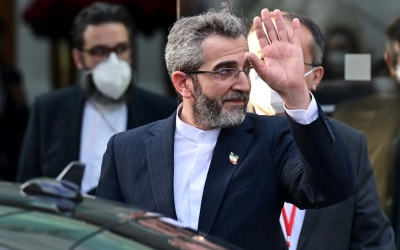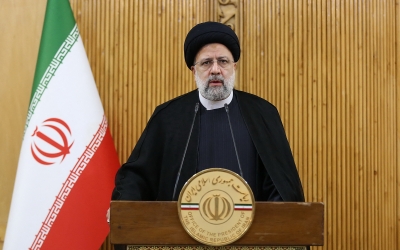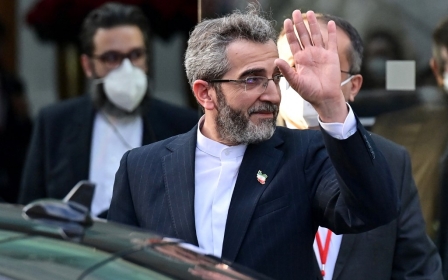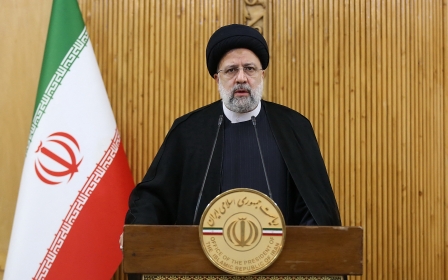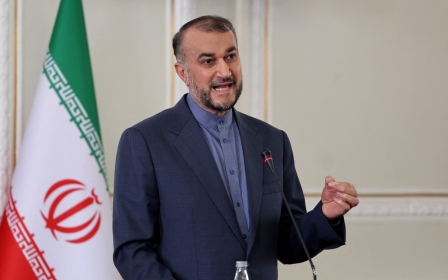Iran nuclear talks: Russia says West's Ukraine sanctions create 'problem' for deal
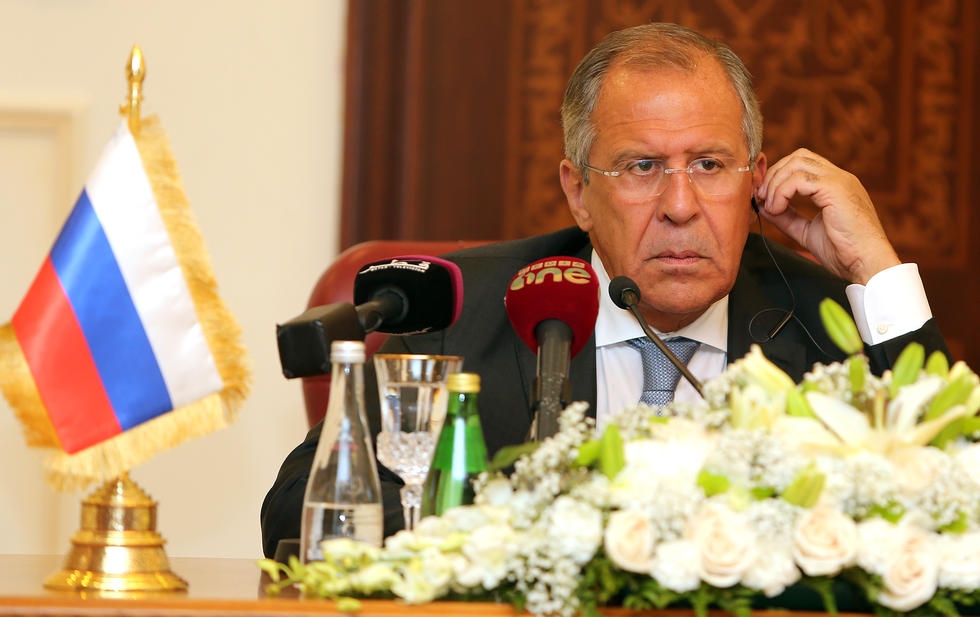
Russia said on Saturday that Western sanctions imposed over the conflict in Ukraine had become a stumbling block for an Iran nuclear deal, warning the West that Russian national interests regarding its relations with Tehran would have to be taken into account.
However, a senior Iranian official told Reuters that Russia's demand for written guarantees from the United States that sanctions on Moscow would not damage its cooperation with Iran is "not constructive" for talks between Tehran and global powers to revive the 2015 nuclear deal.
"Russians had put this demand on table since two days ago," said the official in Tehran.
"There is an understanding that by changing its position in the Vienna talks, Russia wants to secure its interests in other places. This move is not constructive for Vienna nuclear talks."
The announcement, which could torpedo months of intensive indirect talks between Tehran and Washington in Vienna, came shortly after Iran said it had agreed a roadmap with the UN nuclear watchdog to resolve by late June outstanding issues which could help secure the nuclear pact.
New MEE newsletter: Jerusalem Dispatch
Sign up to get the latest insights and analysis on Israel-Palestine, alongside Turkey Unpacked and other MEE newsletters
'Avalanche of aggressive sanctions'
Russian Foreign Minister Sergei Lavrov said the West's sanctions on Russia over its invasion of Ukraine had created a "problem" from Moscow's perspective.
"It would have all been fine, but that avalanche of aggressive sanctions that have erupted from the West - and which I understand has not yet stopped - demand additional understanding by lawyers above all," Lavrov said.
He said Russia wanted a written guarantee from the United States that Russia's trade, investment, and military-technical cooperation with Iran would not be hindered in any way by the sanctions.
"We want an answer - a very clear answer - we need a guarantee that these sanctions will not in any way touch the regime of trade-economic and investment relations, which is laid down in the Joint Comprehensive Plan of Action," Lavrov said.
Lavrov said that under the deal, Russia and China would be allowed to help Iran develop its civilian nuclear programmes in accordance with non-proliferation rules. Sanctions would not be able to affect those projects, he added.
"There are still several topics which our Iranian colleagues want more clarity on and we consider those are fair demands," Lavrov said.
"We have asked for a written guarantee... that the current process triggered by the United States does not in any way damage our right to free and full trade, economic and investment cooperation and military-technical cooperation with the Islamic Republic (Iran)."
Russia's announcement comes as all parties involved in indirect talks between Tehran and Washington aimed at reviving the nuclear pact had earlier said they were close to reaching an agreement in Vienna, but Lavrov's comments now appear to have thrown cold water on that optimism.
Western powers, China and Russia have for almost a year worked closely to revive the accord but the war in Ukraine had created a sense of urgency to conclude talks before cooperation with Moscow became more difficult.
Roadmap
Earlier on Saturday, Iran had said it had agreed a roadmap with the UN nuclear watchdog to resolve all outstanding questions about the country's nuclear programme by late the summer, a move seen as a latest push to revive Tehran's 2015 nuclear deal with global powers.
"We have agreed to provide the IAEA by the end of [the Iranian month of] Khordad [June 21] with documents related to outstanding questions between Tehran and the agency," Mohammad Eslami told a joint news conference with visiting International Atomic Energy Agency (IAEA) chief Rafael Grossi.
Grossi arrived in Tehran late on Friday to discuss one of the last thorny issues blocking revival of the pact, which in return for a lifting of economic sanctions limited Iran's enrichment of uranium, making it harder for Tehran to develop material for nuclear weapons.
"It is important to have this understanding... to work together, to work very intensively," Grossi told the televised news conference.
"Without resolving these [outstanding] issues, efforts to revive the JCPOA (the Joint Comprehensive Plan of Action) may not be possible."
A major sticking point in the talks is that Tehran wants the issue of uranium traces found at several old but undeclared sites in Iran to be closed.
Western powers say that is a separate issue to the deal which the IAEA is not a party to, several officials have told Reuters.
'Still matters that need to be addressed'
Grossi, who also held talks with Iran's foreign minister before returning to Vienna on Saturday, said: "There are still matters that need to be addressed by Iran."
The IAEA has been seeking answers from Iran on how the uranium traces got there - a topic often referred to as "outstanding safeguards issues".
Grossi's trip has raised hopes that an agreement with the IAEA will potentially clear the way for revival of the nuclear pact, abandoned in 2018 by former US President Donald Trump, who also reimposed far-reaching sanctions on Iran.
Since 2019, Tehran has breached the deal's nuclear limits and gone well beyond, rebuilding stockpiles of enriched uranium, refining it to higher fissile purity and installing advanced centrifuges to speed up output.
The IAEA has repeatedly reported that Iran has failed to give satisfactory explanations on the origin of the traces of processed uranium. Those traces suggest there was nuclear material there that Iran did not declare to the agency.
'We are close'
The chief British and French envoys had said on Friday that indirect talks between Iran and the United States on reviving the deal were close to reaching an agreement as they and their German colleague flew home to brief ministers.
"We are close. E3 negotiators leaving Vienna briefly to update Ministers on state of play. Ready to return soon," Stephanie Al-Qaq said on Twitter, referring to the chief British, French, and German diplomats involved in the talks.
"Hoping to return quickly to reach a conclusion because we are very, very close to an agreement," the French envoy, Philippe Errera, also said on Twitter.
Their departure raised the possibility that the US and Iran, which have been talking indirectly because Tehran refuses to meet face to face, might be preparing to sit down together though diplomats said there were no such plans.
"As far as I know, the Iranians are not ready for direct talks," Russian envoy Mikhail Ulyanov told reporters.
"We will have a deal maybe in the middle of next week. We are talking about the last efforts before crossing the finish line."
On Thursday, Ulyanov had said he did not think the talks would now collapse and a ministerial meeting - typically where a deal would be blessed - was likely but he could not say if it would be on Saturday, Sunday or Monday.
'Red lines'
Myriad pieces must fall into place for a deal to happen, including the fate of Western prisoners in Iran.
While US officials say talks on the two issues are separate, the top US negotiator has said Washington unlikely to strike a nuclear deal unless Tehran frees four US citizens that the United States says Iran holds hostage.
Iranian Foreign Minister Hossein Amirabdollahian hinted a nuclear agreement may be close but said the West's "haste" to reach one "cannot prevent the observance of Iran’s red lines."
"We are ready to finalise a good and immediate agreement," Iranian media quoted Amirabdollahian as telling the EU’s top diplomat Joseph Borrell by telephone.
"Most of Iran's requests have been considered in the upcoming agreement."
Middle East Eye delivers independent and unrivalled coverage and analysis of the Middle East, North Africa and beyond. To learn more about republishing this content and the associated fees, please fill out this form. More about MEE can be found here.


